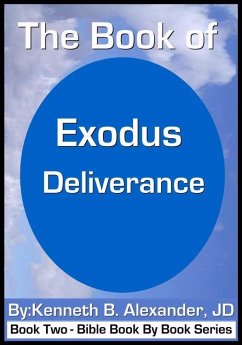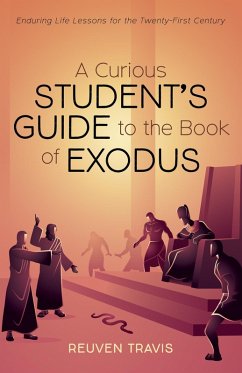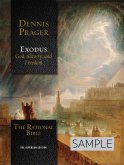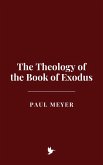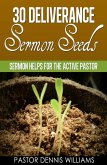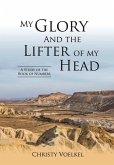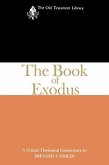Exodus is the story of the deliverance of God's people from Egypt. For hundreds of years the Israelites had prospered in Goshen where they had settled since the time of Joseph. They had prospered in Goshen and become very fruitful and had increased in population. However the scripture says a new King arose over Egypt, who did not know [the legacy of] Joseph. He said to his people, "Behold, the people of the sons of Israel are more and mightier than we. "Come, let us deal wisely with them, or else they will multiply and in the event of war, they will also join themselves to those who hate us, and fight against us and depart from the land" (Ex. 1:8-10). The Pharaoh decided on a plan of action that would reduce the number of Israelites in Egypt. He called for the extermination of all Hebrew born males. He also essentially made the Israelites slaves. "So they appointed taskmasters over them to afflict them with hard labor. And they built for Pharaoh storage cities, Pithom and Raamses (Exodus 1:10-11). "The Egyptians compelled the sons of Israel to labor rigorously; and they made their lives bitter with hard labor in mortar and bricks and at all kinds of labor in the field, all their labors which they rigorously imposed on them" (Ex 1:13-14). This set the stage for Moses, who was raised in Egypt, to accept God's commission to deliver the Israelites from their slavery in Egypt. Moses went back into Egypt with Aaron his brother and set about to do God's will. Moses performed the greatest miracles ever performed until Christ including the death of every firstborn Son in Egypt on the day of Passover. As he left Egypt he was pursued by Pharaoh and his armies. Moses parted the Reed Sea (some translations Red Sea), the Israelites crossed but Pharaoh's army was drown as the waters came back. Moses set up camp with the Israelites in the desert wilderness. While there he received the Law of God on Mt. Sinai including the 10 commandments. The Law was instituted in the Israeli camp and Feast days were ordained. The details of Israel's stay in the wilderness are continued in the Book of Numbers. As we shall see here and in the book of Leviticus the Exodus has great spiritual significance to believers in Christ today. As Christ delivered all people on the cross from slavery to corruption so Moses delivered the Israelites from slavery of another kind. While Moses was performing God's miracles God was bringing judgment on the pagan gods of Egypt, the greatest civilization in the land. Each judgment corresponded to an Egyptian god. The Passover is rich in Christian significance (see below). The Feast of Booths and the Day of Atonement represent Christ's forgiving work on the cross. Moses received the Law on Mt. Sinai which Law becomes our teacher in leading us to Christ. Moses also established Israel as a Nation as he became their Lawgiver and mouthpiece of God. The priesthood was created and instituted by the tribe of Levi. A tabernacle (or sacred tent) was constructed after the pattern that would reflect Solomon's temple built later. The ark of the covenant was constructed which contained the presence of God and went before the Israelites in all battles. Likewise animal sacrifices were instituted for forgiveness of sin. The Lord provided a cloud by day for shade and a pillar of fire by night for light and warmth. This is just as Christ cares for His people's every need. Food was also rained down from heaven every day as Christ gives each his/her daily bread of the Word. Moses faced rebellion in the wilderness which resulted in swift judgment as Christ will judge all rebellion in the last days. He endured numerous grumblings by the children of Israel and was blamed for their every discomfort. The man Moses was called the most humble man on the earth at that time. His response to God's word and to every difficulty was to prostrate himself before God in worship. Moses also bargained with God saving the Israelites destruction more than once. As genesis was the Book of beginnings so Exodus is the Book of deliverance and establishment of the nation in a desert wilderness. All of Exodus was in preparation for Israel to take the Promised Land God had promised to Abraham, Isaac and Jacob. The Calling Moses was born to a Hebrew woman in Egypt. Fearing for her son's life due to the edict of death to all Hebrew male children issued by the Pharaoh she hid Moses in a wicker basket and floated him down the Nile. The daughter of Pharaoh found Moses in the basket, saw that he was a beautiful child, and decided to keep him for her own. Thus Moses grew up among the rulers of Egypt for the next 40 years. He became an adopted son of the Pharaoh (Ex. 2:1-10). However he never lost his Hebrew heritage in his heart. "Now it came about in those days, when Moses had grown up, that he went out to his brethren and looked on their hard labors; and he saw an Egyptian beating a Hebrew, one of his brethren. So he looked this way and that, and when he saw there was no one around, he struck down the Egyptian and hid him in the sand" (Ex 2:11-12). When Pharaoh found out that Moses had committed murder he sought to kill Moses but Moses fled Egypt and traveled to Midian, some distance away. (Ex. 2:15). The priest of Midian, Jethro, received Moses as his son and gave him his daughter Zipporoh for a wife. Moses worked 40 years for Jethro as a sheepherder. "Now it came about in the course of those many days that the king of Egypt died. And the sons of Israel sighed because of the bondage, and they cried out; and their cry for help because of their bondage rose up to God. So God heard their groaning; and God remembered His covenant with Abraham, Isaac, and Jacob. God saw the sons of Israel, and God took notice of them" (Ex. 2:23-25). "Now Moses was pasturing the flock of Jethro his father-in-law, the priest of Midian; and he led the flock to the west side of the wilderness and came to Horeb the mountain of God [Horeb is also named Mt Sinai.] The angel of the LORD appeared to him in a blazing fire from the midst of a bush; and he looked, and behold, the bush was burning with fire, yet the bush was not consumed" (Ex. 3:1-2). The Lord spoke to Moses from the bush: "He said "I am the God of your father, the God of Abraham, the God of Isaac, and the God of Jacob. Then Moses hid his face, for he was afraid to look at God. The LORD said, "I have surely seen the affliction of My people who are in Egypt, and have given heed to their cry because of their taskmasters, for I am aware of their sufferings. "So I have come down to deliver them from the power of the Egyptians, and to bring them up from that land to a good and spacious land, to a land flowing with milk and honey, to the place of the Canaanite and the Hittite and the Amorite and the Perizzite and the Hivite and the Jebusite [all descendants of Ham, Canaan and Cush, see Genesis] "Now, behold, the cry of the sons of Israel has come to Me; furthermore, I have seen the oppression with which the Egyptians are oppressing them "(Ex. 3:6-9). The land of Canaan was the place Abraham, Isaac and Jacob had dwelt. God was saying that He was ready to fulfill His promise to them and give them this land for their own. Moses accepted the commission rather reluctantly. He told God he was a man of slow speech (he stuttered).He grumbled "What if they don't receive me?" Moses said: "Who am I, that I should go to Pharaoh, and that I should bring the sons of Israel out of Egypt?" And God said, "Certainly I will be with you, and this shall be the sign to you that it is I who have sent you: when you have brought the people out of Egypt, you shall worship God at this mountain." [Horeb]. This is a curious scripture. Moses was concerned about just getting the people out of Egypt. Then God said He would give Moses a sign. The sign was that "after" Moses got the people out of Egypt they would worship at this mountain. God gave no sign how he was going to deliver the people from Egypt. "Then Moses said to God, "Behold, I am going to the sons of Israel, and I will say to them, 'The God of your fathers has sent me to you.' Now they may say to me, 'What is His name?', What shall I say to them?" God said to Moses "I AM WHO I AM" [translated roughly from Hebrew YHWH] and He said, "Thus you shall say to the sons of Israel, I AM has sent me to you.' " (Ex 3:10-15). Moses still maintained his objections to God's call. He wanted another sign. So God had Moses throw his rod on the ground and it became a snake. Moses grabbed it again and it became a rod. God also said that Aaron his brother could be Moses' mouthpiece due to his slowness of his speech. God began to get angry as Moses threw one excuse after another at God as to why he was the wrong man for the Job. This becomes a pattern in the scriptures of reluctant men being chosen vessels of Gods to do a job when they would have rather stayed home (Gideon, Jonah, Amos, David the lowly shepherd King Etc). God always chooses the least and weakest over the stronger. God judges not by outward appearance but by the heart. Paul said: "Therefore I am well content with weaknesses, with insults, with distresses, with persecutions, with difficulties, for Christ's sake; for when I am weak, then I am strong" (2 Corinthians 12:10). "For behold your calling, brethren, that not many wise after the flesh, not many mighty, not many noble, are called: but God chose the foolish things of the world, that he might put to shame them that are wise; and God chose the weak things of the world, that he might put to shame the things that are strong; and the base things of the world, and the things that are despised, did God choose, yea and the things that are not, that he might bring to nought the things that are: that no flesh should glory before God.( I Corinthians 1:26-31).
Dieser Download kann aus rechtlichen Gründen nur mit Rechnungsadresse in A, D ausgeliefert werden.

